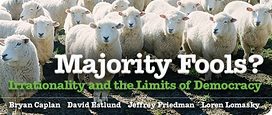Bryan, you sensibly ask whether I can really maintain (as I claim to) that the quality of the decisions is important, even though I don’t think you are entitled to overrule the majority even when you know what decisions would be better. Do I support the democratic process regardless of the quality of the decisions?
Just before I answer that, remember I tried to put the view you flirt with here into an uncomfortable corner. So there’s still a question for you hanging out there: Do you think that “I know best” is a fully sufficient basis for “I should rule?” So, the only reason the Catholics aren’t entitled to rule the rest of us is because their views are actually wrong? Yikes. And does that mean that the advocates of the true world view get to rule the rest of us? The inference from experts to bosses doesn’t seem to hold up.
Now, I agree with you that democracy cannot be defended without any attention to how well it can be expected to perform on substantive grounds. The question that motivates my thinking about democracy is precisely whether this epistemic dimension can be incorporated into our account of political authority without being led to “epistocracy,” or rule of the knowers, a la Plato (and Caplan?). I think non-epistemic defenses of democracy can be shown to be deeply inadequate. (Maybe more on this later.)
So let me just very briefly telegraph the structure of the view I defend at great length elsewhere in order to indicate that I do indeed think that quality of decisions matters AND that you don’t get to rule just by knowing best. We can fill in the blanks as we go on if you like.
As I said in my previous post, I think political justification requires a kind of general acceptability. I argue that it is unlikely that any proposed identification of the epistocrats (those better qualified to rule) can meet that test. (The most formidable candidate is probably the one you propose: the educated. So I devote a chapter to it in my book… oops I was going to try not to plug the book.) If epistocracy can’t meet the test, can any epistemic strategy meet it? Well, notice that the idea (bear with me) that multiple people talking and thinking together can apply intelligence to political problems in such a way as to perform at least better than random, has the following salient feature: it doesn’t rely on any invidious comparisons between the knowers and the non-knowers, and yet proposes an epistemic engine rather than a merely procedural standard. OK, that raises tons of questions, but we don’t want long posts, so I’ll pause. But the answer to your question is that I do agree we need the epistemic dimension, and I don’t agree that this leads in an epistocratic direction.

